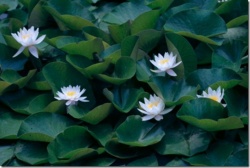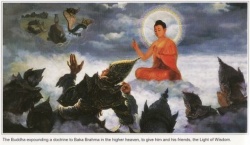Difference between revisions of "Bhutamidam Sutta"
| (One intermediate revision by the same user not shown) | |||
| Line 4: | Line 4: | ||
[[Thanissaro Bhikkhu]]}}<br/><br/> | [[Thanissaro Bhikkhu]]}}<br/><br/> | ||
| − | On one occasion the [[Blessed One]] was staying near [[Savatthi]] in [[Jeta's Grove]], [[Anathapindika's]] [[monastery]]. There he addressed Ven. [[Sariputta]], "[[Sariputta]], it is said in [[Ajita's]] Question in the Way to the Further Shore:[1] | + | On one [[occasion]] the [[Blessed One]] was staying near [[Savatthi]] in [[Jeta's Grove]], [[Anathapindika's]] [[monastery]]. There he addressed Ven. [[Sariputta]], "[[Sariputta]], it is said in [[Ajita's]] Question in the Way to the Further Shore:[1] |
Those here who have fathomed the [[Dhamma]], | Those here who have fathomed the [[Dhamma]], | ||
| Line 30: | Line 30: | ||
"Do you see, [[Sariputta]], that 'this has come into being'?" | "Do you see, [[Sariputta]], that 'this has come into being'?" | ||
| − | "One sees with right [[discernment]], [[lord]], that 'this has come into being.' [[Seeing]] with right [[discernment]] that 'this has come into being,' one practices for disenchantment with, for dispassion toward, for the [[cessation]] of what has come into being. One sees with right [[discernment]] that 'it has come into being from this nutriment.' [[Seeing]] with right [[discernment]] that 'it has come into being from this nutriment,' one practices for disenchantment with, for dispassion toward, for the [[cessation]] of the nutriment by which it has come into being. One sees with right [[discernment]] that 'from the [[cessation]] of this nutriment, what has come into being is [[subject]] to [[cessation]].' [[Seeing]] with right [[discernment]] that 'from the [[cessation]] of this nutriment, what has come into being is [[subject]] to [[cessation]],' one practices for disenchantment with, for dispassion toward, for the [[cessation]] of what is [[subject]] to [[cessation]]. This is how one is a learner. | + | "One sees with right [[discernment]], [[lord]], that 'this has come into being.' [[Seeing]] with right [[discernment]] that 'this has come into being,' one practices for disenchantment with, for [[dispassion]] toward, for the [[cessation]] of what has come into being. One sees with right [[discernment]] that 'it has come into being from this nutriment.' [[Seeing]] with right [[discernment]] that 'it has come into being from this nutriment,' one practices for disenchantment with, for [[dispassion]] toward, for the [[cessation]] of the nutriment by which it has come into being. One sees with right [[discernment]] that 'from the [[cessation]] of this nutriment, what has come into being is [[subject]] to [[cessation]].' [[Seeing]] with right [[discernment]] that 'from the [[cessation]] of this nutriment, what has come into being is [[subject]] to [[cessation]],' one practices for disenchantment with, for [[dispassion]] toward, for the [[cessation]] of what is [[subject]] to [[cessation]]. This is how one is a learner. |
"And how, [[lord]], is one a [[person]] who has fathomed the [[Dhamma]]? | "And how, [[lord]], is one a [[person]] who has fathomed the [[Dhamma]]? | ||
| − | "One sees with right [[discernment]], [[lord]], that 'this has come into being.' [[Seeing]] with right [[discernment]] that 'this has come into being,' one is — through disenchantment, dispassion, [[cessation]], through lack of clinging/sustenance — released from what has come into being. One sees with right [[discernment]] that 'it has come into being from this nutriment.' [[Seeing]] with right [[discernment]] that 'it has come into being from this nutriment,' one is — through disenchantment, dispassion, [[cessation]], through lack of clinging/sustenance — released from the nutriment by which it has come into being. One sees with right [[discernment]] that 'from the [[cessation]] of this nutriment, what has come into being is [[subject]] to [[cessation]].' [[Seeing]] with right [[discernment]] that 'from the [[cessation]] of this nutriment, what has come into being is [[subject]] to [[cessation]],' one is — through disenchantment, dispassion, [[cessation]], through lack of clinging/sustenance — released from what is [[subject]] to [[cessation]]. This is how one is a [[person]] who has fathomed the [[Dhamma]]. | + | "One sees with right [[discernment]], [[lord]], that 'this has come into being.' [[Seeing]] with right [[discernment]] that 'this has come into being,' one is — through disenchantment, [[dispassion]], [[cessation]], through lack of clinging/sustenance — released from what has come into being. One sees with right [[discernment]] that 'it has come into being from this nutriment.' [[Seeing]] with right [[discernment]] that 'it has come into being from this nutriment,' one is — through disenchantment, [[dispassion]], [[cessation]], through lack of clinging/sustenance — released from the nutriment by which it has come into being. One sees with right [[discernment]] that 'from the [[cessation]] of this nutriment, what has come into being is [[subject]] to [[cessation]].' [[Seeing]] with right [[discernment]] that 'from the [[cessation]] of this nutriment, what has come into being is [[subject]] to [[cessation]],' one is — through disenchantment, [[dispassion]], [[cessation]], through lack of clinging/sustenance — released from what is [[subject]] to [[cessation]]. This is how one is a [[person]] who has fathomed the [[Dhamma]]. |
"It is in this way, [[lord]], that I understand the detailed meaning of the brief statement in [[Ajita's]] Question in the Way to the Further Shore: | "It is in this way, [[lord]], that I understand the detailed meaning of the brief statement in [[Ajita's]] Question in the Way to the Further Shore: | ||
| Line 45: | Line 45: | ||
tell me their [[manner]] of [[life]]." | tell me their [[manner]] of [[life]]." | ||
| − | "{{Wiki|Excellent}}, [[Sariputta]]. {{Wiki|Excellent}}. One sees with right [[discernment]] that 'this has come into being.' [[Seeing]] with right [[discernment]] that 'this has come into being,' one practices for disenchantment with, for dispassion toward, for the [[cessation]] of what has come into being. One sees with right [[discernment]] that 'it has come into being from this nutriment.' [[Seeing]] with right [[discernment]] that 'it has come into being from this nutriment,' one practices for disenchantment with, for dispassion toward, for the [[cessation]] of the nutriment by which it has come into being. One sees with right [[discernment]] that 'from the [[cessation]] of this nutriment, what has come into being is [[subject]] to [[cessation]].' [[Seeing]] with right [[discernment]] that 'from the [[cessation]] of this nutriment, what has come into being is [[subject]] to [[cessation]],' one practices for disenchantment with, for dispassion toward, for the [[cessation]] of what is [[subject]] to [[cessation]]. This is how one is a learner. | + | "{{Wiki|Excellent}}, [[Sariputta]]. {{Wiki|Excellent}}. One sees with right [[discernment]] that 'this has come into being.' [[Seeing]] with right [[discernment]] that 'this has come into being,' one practices for disenchantment with, for [[dispassion]] toward, for the [[cessation]] of what has come into being. One sees with right [[discernment]] that 'it has come into being from this nutriment.' [[Seeing]] with right [[discernment]] that 'it has come into being from this nutriment,' one practices for disenchantment with, for [[dispassion]] toward, for the [[cessation]] of the nutriment by which it has come into being. One sees with right [[discernment]] that 'from the [[cessation]] of this nutriment, what has come into being is [[subject]] to [[cessation]].' [[Seeing]] with right [[discernment]] that 'from the [[cessation]] of this nutriment, what has come into being is [[subject]] to [[cessation]],' one practices for disenchantment with, for [[dispassion]] toward, for the [[cessation]] of what is [[subject]] to [[cessation]]. This is how one is a learner. |
"And how is one a [[person]] who has fathomed the [[Dhamma]]? | "And how is one a [[person]] who has fathomed the [[Dhamma]]? | ||
| − | "One sees with right [[discernment]] that 'this has come into being.' [[Seeing]] with right [[discernment]] that 'this has come into being,' one is — through disenchantment, dispassion, [[cessation]], through lack of clinging/sustenance — released from what has come into being. One sees with right [[discernment]] that 'it has come into being from this nutriment.' [[Seeing]] with right [[discernment]] that 'it has come into being from this nutriment,' one is — through disenchantment, dispassion, [[cessation]], through lack of clinging/sustenance — released from the nutriment by which it has come into being. One sees with right [[discernment]] that 'from the [[cessation]] of this nutriment, what has come into being is [[subject]] to [[cessation]].' [[Seeing]] with right [[discernment]] that 'from the [[cessation]] of this nutriment, what has come into being is [[subject]] to [[cessation]],' one is — through disenchantment, dispassion, [[cessation]], through lack of clinging/sustenance — released from what is [[subject]] to [[cessation]]. This is how one is a [[person]] who has fathomed the [[Dhamma]]. | + | "One sees with right [[discernment]] that 'this has come into being.' [[Seeing]] with right [[discernment]] that 'this has come into being,' one is — through disenchantment, [[dispassion]], [[cessation]], through lack of clinging/sustenance — released from what has come into being. One sees with right [[discernment]] that 'it has come into being from this nutriment.' [[Seeing]] with right [[discernment]] that 'it has come into being from this nutriment,' one is — through disenchantment, [[dispassion]], [[cessation]], through lack of clinging/sustenance — released from the nutriment by which it has come into being. One sees with right [[discernment]] that 'from the [[cessation]] of this nutriment, what has come into being is [[subject]] to [[cessation]].' [[Seeing]] with right [[discernment]] that 'from the [[cessation]] of this nutriment, what has come into being is [[subject]] to [[cessation]],' one is — through disenchantment, [[dispassion]], [[cessation]], through lack of clinging/sustenance — released from what is [[subject]] to [[cessation]]. This is how one is a [[person]] who has fathomed the [[Dhamma]]. |
"It is in this way that the detailed meaning of the brief statement in [[Ajita's]] Question in the Way to the Further Shore is to be understood: | "It is in this way that the detailed meaning of the brief statement in [[Ajita's]] Question in the Way to the Further Shore is to be understood: | ||
Latest revision as of 07:11, 9 March 2015
This Has Come Into Being
translated from the Pali by
Thanissaro Bhikkhu
On one occasion the Blessed One was staying near Savatthi in Jeta's Grove, Anathapindika's monastery. There he addressed Ven. Sariputta, "Sariputta, it is said in Ajita's Question in the Way to the Further Shore:[1]
Those here who have fathomed the Dhamma, those who are learners, those who are run-of-the-mill: When you, dear sir, astute, are asked this, tell me their manner of life. "How is the detailed meaning of this brief statement to be understood?"
When this was said, Ven. Sariputta remained silent.
A second time... A third time the Blessed One addressed Ven. Sariputta, "Sariputta, it is said in Ajita's Question in the Way to the Further Shore:
Those here who have fathomed the Dhamma, those who are learners, those who are run-of-the-mill: When you, dear sir, astute, are asked this, tell me their manner of life. "How is the detailed meaning of this brief statement to be understood?"
A third time, Ven. Sariputta remained silent.
"Do you see, Sariputta, that 'this has come into being'?"
"One sees with right discernment, lord, that 'this has come into being.' Seeing with right discernment that 'this has come into being,' one practices for disenchantment with, for dispassion toward, for the cessation of what has come into being. One sees with right discernment that 'it has come into being from this nutriment.' Seeing with right discernment that 'it has come into being from this nutriment,' one practices for disenchantment with, for dispassion toward, for the cessation of the nutriment by which it has come into being. One sees with right discernment that 'from the cessation of this nutriment, what has come into being is subject to cessation.' Seeing with right discernment that 'from the cessation of this nutriment, what has come into being is subject to cessation,' one practices for disenchantment with, for dispassion toward, for the cessation of what is subject to cessation. This is how one is a learner.
"And how, lord, is one a person who has fathomed the Dhamma?
"One sees with right discernment, lord, that 'this has come into being.' Seeing with right discernment that 'this has come into being,' one is — through disenchantment, dispassion, cessation, through lack of clinging/sustenance — released from what has come into being. One sees with right discernment that 'it has come into being from this nutriment.' Seeing with right discernment that 'it has come into being from this nutriment,' one is — through disenchantment, dispassion, cessation, through lack of clinging/sustenance — released from the nutriment by which it has come into being. One sees with right discernment that 'from the cessation of this nutriment, what has come into being is subject to cessation.' Seeing with right discernment that 'from the cessation of this nutriment, what has come into being is subject to cessation,' one is — through disenchantment, dispassion, cessation, through lack of clinging/sustenance — released from what is subject to cessation. This is how one is a person who has fathomed the Dhamma.
"It is in this way, lord, that I understand the detailed meaning of the brief statement in Ajita's Question in the Way to the Further Shore:
Those here who have fathomed the Dhamma, those who are learners, those who are run-of-the-mill: When you, dear sir, astute, are asked this, tell me their manner of life."
"Excellent, Sariputta. Excellent. One sees with right discernment that 'this has come into being.' Seeing with right discernment that 'this has come into being,' one practices for disenchantment with, for dispassion toward, for the cessation of what has come into being. One sees with right discernment that 'it has come into being from this nutriment.' Seeing with right discernment that 'it has come into being from this nutriment,' one practices for disenchantment with, for dispassion toward, for the cessation of the nutriment by which it has come into being. One sees with right discernment that 'from the cessation of this nutriment, what has come into being is subject to cessation.' Seeing with right discernment that 'from the cessation of this nutriment, what has come into being is subject to cessation,' one practices for disenchantment with, for dispassion toward, for the cessation of what is subject to cessation. This is how one is a learner.
"And how is one a person who has fathomed the Dhamma?
"One sees with right discernment that 'this has come into being.' Seeing with right discernment that 'this has come into being,' one is — through disenchantment, dispassion, cessation, through lack of clinging/sustenance — released from what has come into being. One sees with right discernment that 'it has come into being from this nutriment.' Seeing with right discernment that 'it has come into being from this nutriment,' one is — through disenchantment, dispassion, cessation, through lack of clinging/sustenance — released from the nutriment by which it has come into being. One sees with right discernment that 'from the cessation of this nutriment, what has come into being is subject to cessation.' Seeing with right discernment that 'from the cessation of this nutriment, what has come into being is subject to cessation,' one is — through disenchantment, dispassion, cessation, through lack of clinging/sustenance — released from what is subject to cessation. This is how one is a person who has fathomed the Dhamma.
"It is in this way that the detailed meaning of the brief statement in Ajita's Question in the Way to the Further Shore is to be understood:
Those here who have fathomed the Dhamma, those who are learners, those who are run-of-the-mill: When you, dear sir, astute, are asked this, tell me their manner of life."
Note
1. See Sn 5.1.



